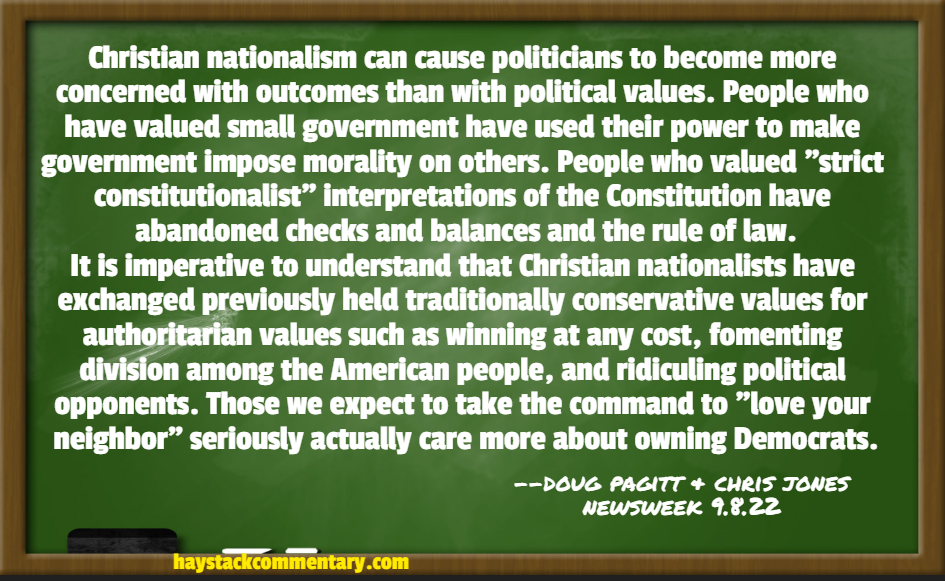doug pagitt
Doug Pagitt is an American author, pastor, social activist. He is Co-founder and Executive Director of Vote Common Good, a national political non-profit dedicated to inspiring, energizing, and mobilizing people of faith to engage in civic life. In 2000, Doug was founding pastor of Solomon’s Porch, a Holistic Missional Christian Community in Minneapolis, Minnesota. He also founded and remains active with the Greater Things Foundation, a charitable non-profit for empowering and fostering more beautiful, inclusive, and life-giving communities.
 Doug Pagitt Files
Doug Pagitt Files
Beyond voting, citizens can seek to understand the attractiveness of Christian nationalism to some of their fellow citizens. Christian nationalism promises a return to a time when their comfort and certainty were privileged. This promise appeals to a fear that cannot be overcome by shame. It must be overcome by love.
Christian people, all across the political spectrum, need to remember the words of Scripture, "Perfect love drives out fear." --Doug Pagitt (w/Chris Jones); Newsweek; 9.8.22
Christian people, all across the political spectrum, need to remember the words of Scripture, "Perfect love drives out fear." --Doug Pagitt (w/Chris Jones); Newsweek; 9.8.22

A coalition of evangelical Christian leaders is condemning the role of "radicalized Christian nationalism" in feeding the political extremism that led to the violent insurrection at the U.S. Capitol on Jan. 6 by supporters of former President Donald Trump.
In an open letter, more than 100 pastors, ministry and seminary leaders, and other prominent evangelicals express concern about the growing "radicalization" they're seeing, particularly among white evangelicals.
The letter notes that some members of the mob that stormed the Capitol carried Christian symbols and signs that read, "Jesus Saves," and that one of the rioters stood on the Senate rostrum and led a Christian prayer. The letter calls on other Christian leaders to take a public stand against racism, Christian nationalism, conspiracy theories and political extremism.
The letter reads, in part:
"We recognize that evangelicalism, and white evangelicalism in particular, has been susceptible to the heresy of Christian nationalism because of a long history of faith leaders accommodating white supremacy. We choose to speak out now because we do not want to be quiet accomplices in this on-going sin.""People from our very communities called people to this action in the days before, unleashed them into the Capitol, and then chose to baptize that action in the name of Christ," Pagitt said. "And this is our time where we need to stand up."
--Wyoming Public Media: Evangelical Leaders Condemn 'Radicalized Christian Nationalism' 1.24.21
In an open letter, more than 100 pastors, ministry and seminary leaders, and other prominent evangelicals express concern about the growing "radicalization" they're seeing, particularly among white evangelicals.
The letter notes that some members of the mob that stormed the Capitol carried Christian symbols and signs that read, "Jesus Saves," and that one of the rioters stood on the Senate rostrum and led a Christian prayer. The letter calls on other Christian leaders to take a public stand against racism, Christian nationalism, conspiracy theories and political extremism.
The letter reads, in part:
"We recognize that evangelicalism, and white evangelicalism in particular, has been susceptible to the heresy of Christian nationalism because of a long history of faith leaders accommodating white supremacy. We choose to speak out now because we do not want to be quiet accomplices in this on-going sin.""People from our very communities called people to this action in the days before, unleashed them into the Capitol, and then chose to baptize that action in the name of Christ," Pagitt said. "And this is our time where we need to stand up."
--Wyoming Public Media: Evangelical Leaders Condemn 'Radicalized Christian Nationalism' 1.24.21
 Doug Pagitt Files
Doug Pagitt Files
"I am not trying to assign to people something that they didn't want assigned to them — that they were moving and marching in Christ's name.....People from our very communities called people to this action in the days before, unleashed them into the Capitol, and then chose to baptize that action in the name of Christ.....And this is our time where we need to stand up."
--Doug Pagitt 2.24.21
"I am not trying to assign to people something that they didn't want assigned to them — that they were moving and marching in Christ's name.....People from our very communities called people to this action in the days before, unleashed them into the Capitol, and then chose to baptize that action in the name of Christ.....And this is our time where we need to stand up."
--Doug Pagitt 2.24.21
 Doug Pagitt Files
Doug Pagitt Files
This Christian nationalist fight to “save America” is far from over. In September, a poll commissioned by Politico found that 61 percent of Republican respondents supported the idea of declaring the United States a Christian nation. And an October survey from the Pew Research center found that even while political leaders are embracing the Christian nationalist label with never-before-seen fervor, more than half of all U.S. adults have not heard or read anything about Christian nationalism. An additional 16 percent claimed they didn’t know enough about the movement to take a position.
That needs to change. And that’s why this preacher gave up his pulpit for a big orange bus in the run-up to the midterms. That bus took me and other leaders from my group, Vote Common Good, from Dallas, to Grand Rapids, to Columbus to Pittsburgh, educating voters about the dangers of Christian nationalism. We were joined by hundreds of church leaders at rallies urging people of good faith and conscience to vote against candidates who stand for political violence and Christian nationalism.
In Pennsylvania, we rallied alongside Democrat Josh Shapiro — who won last Tuesday’s gubernatorial race — to denounce Mastriano’s full-fledged Christian nationalist campaign. In Columbus, a woman who has voted Republican all of her life attended one of our training sessions on how to identify and confront Christian nationalism. Afterward, she told me she is terrified by her party’s embrace of the idea.
Slowly, politicians are starting to realize the stakes. But with the 2024 elections looming, Democrats can’t afford to delay any longer — they need to call out Christian nationalism now.
As an evangelical pastor, I believe in the power of spirituality. I also believe in the power of speaking out against those who use spirituality for their own political gain, rather than the common good of all people. It’s time Democrats started making some noise. --Doug Paggit; Op-Ed in The Hill; 2.24.21
That needs to change. And that’s why this preacher gave up his pulpit for a big orange bus in the run-up to the midterms. That bus took me and other leaders from my group, Vote Common Good, from Dallas, to Grand Rapids, to Columbus to Pittsburgh, educating voters about the dangers of Christian nationalism. We were joined by hundreds of church leaders at rallies urging people of good faith and conscience to vote against candidates who stand for political violence and Christian nationalism.
In Pennsylvania, we rallied alongside Democrat Josh Shapiro — who won last Tuesday’s gubernatorial race — to denounce Mastriano’s full-fledged Christian nationalist campaign. In Columbus, a woman who has voted Republican all of her life attended one of our training sessions on how to identify and confront Christian nationalism. Afterward, she told me she is terrified by her party’s embrace of the idea.
Slowly, politicians are starting to realize the stakes. But with the 2024 elections looming, Democrats can’t afford to delay any longer — they need to call out Christian nationalism now.
As an evangelical pastor, I believe in the power of spirituality. I also believe in the power of speaking out against those who use spirituality for their own political gain, rather than the common good of all people. It’s time Democrats started making some noise. --Doug Paggit; Op-Ed in The Hill; 2.24.21
 Doug Pagitt Files
Doug Pagitt Files
As soon as you let yourself think that God is distant and that we need to work to maintain our connection to God, then we're turning faith into a deal, a transaction. We bob and weave throughout our lives, trying to keep up with this transaction we've made. We begin to tell people that you have to follow these steps, or those steps, to be properly purified and to be connected with God most purely. That's an unfortunate pinch point in Christianity-and it just doesn't make sense to so many people today. Maintaining that transaction just doesn't feel good in our lives. Most of my friends who've left Christianity have left over this issue. They want a faith, or a spiritual expression of life, that doesn't amount to a transactional deal. I've heard from early readers of this book that their first reaction is-relief. They feel relief to realize that it doesn't have to be this way. --Doug Pagit; Day 1; 3.20.15
 Doug Pagitt Files
Doug Pagitt Files
"The preposition in is a profoundly meaningful word. And flipping the order of words from 'God is in all' to 'all is In God' is more than a semantic move. It offers a clearer, more honest, more biblical understanding of who God is and who we are In God"
--Doug Pagitt; Flipped: The Provocative Truth That Changes Everything We Know About God. 2015
"The preposition in is a profoundly meaningful word. And flipping the order of words from 'God is in all' to 'all is In God' is more than a semantic move. It offers a clearer, more honest, more biblical understanding of who God is and who we are In God"
--Doug Pagitt; Flipped: The Provocative Truth That Changes Everything We Know About God. 2015

